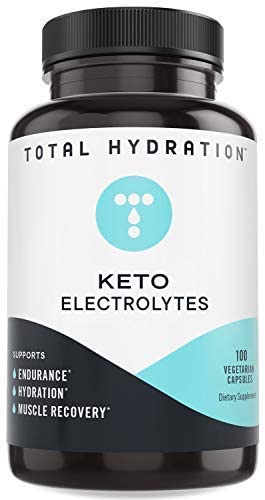If you’re on keto, you may benefit from a keto supplement to help make sure you’ve got all of your nutrient bases covered.
These supplements contain a variety of nutrients and electrolytes to help optimize your nutrition status and fill in the gaps that may be present in your diet.
These supplements provide the electrolytes you need on keto, along with some extras that may help you in your weight loss journey.
Here are our rankings of the best keto supplements on the market right now, plus an in-depth look at the science behind keto supplements.
Research
Rankings
1. Zeal Naturals Maximum Keto Electrolytes
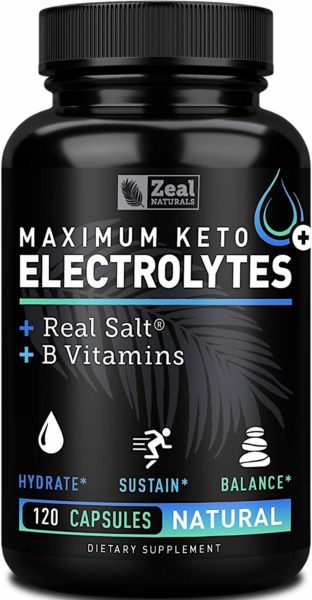
Zeal Naturals Maximum Keto Electrolytes tops our list for several reasons.
It’s specifically formulated for people on a keto diet to meet their electrolyte needs, and it also contains added B vitamins.
It’s made with high-quality ingredients like Redmond’s Real Salt and magnesium stearate — which is one of the most easily absorbable forms of magnesium.
Additionally, this supplement went through third-party testing to ensure that the label is an honest representation of what’s in the bottle.
2. Youth & Tonic MCT Keto Electrolyte Supplement
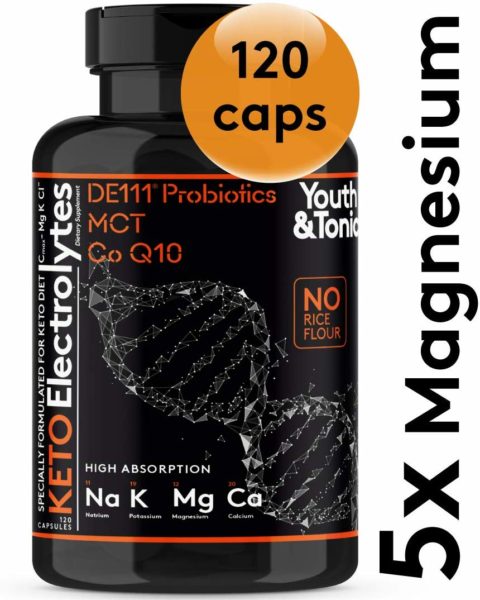
This keto electrolyte supplement from Youth & Tonic is packed not only with electrolytes, but also with other ingredients that can help you optimize your nutrition on keto.
It contains added medium-chain triglyceride (MCT) oil and Coenzyme Q10 (CoQ10), which can help boost your energy.
In addition, it contains a unique formulation of probiotics — healthy bacteria that can populate your gut to potentially improve your blood sugar levels, insulin sensitivity, digestion, and immune health.
It also contains added chromium and manganese, two key minerals that can help you better manage your blood sugar levels as you transition into ketosis, and beyond.
3. Key Nutrients Electrolyte Powder
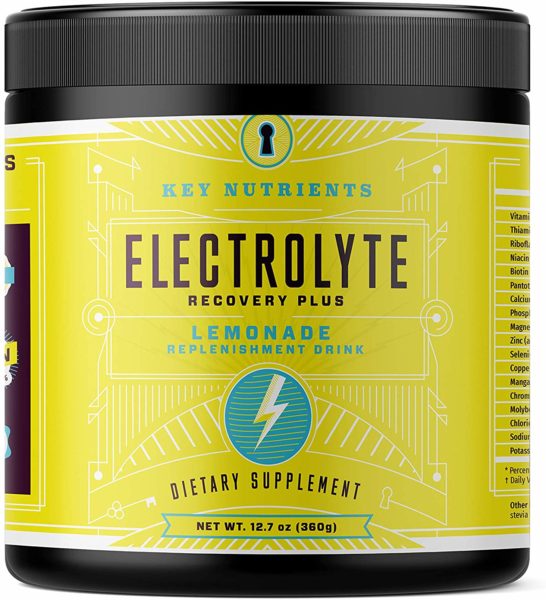
Key Nutrients Electrolyte Powder is a solid choice for keto dieters, as it not only provides much-needed electrolytes but can also double as a multivitamin.
Best of all, it comes in convenient powder form and can be mixed into your water. It’s sweetened with stevia, so it’s totally keto-friendly.
Finally, this supplement is made in an FDA-approved facility and has undergone third-party testing from NSF International to ensure its quality.
4. Total Hydration Keto+ Electrolytes Supplement
Total Hydration Keto+ Electrolytes earned a spot on our list because it’s a vegan — making it a perfect option for anyone following a plant-based keto diet.
It contains vegan forms of the four key electrolytes — sodium, potassium, magnesium, and calcium. According to its manufacturer, this supplement may even help with hangovers.
5. Perfect Keto Electrolyte Pills
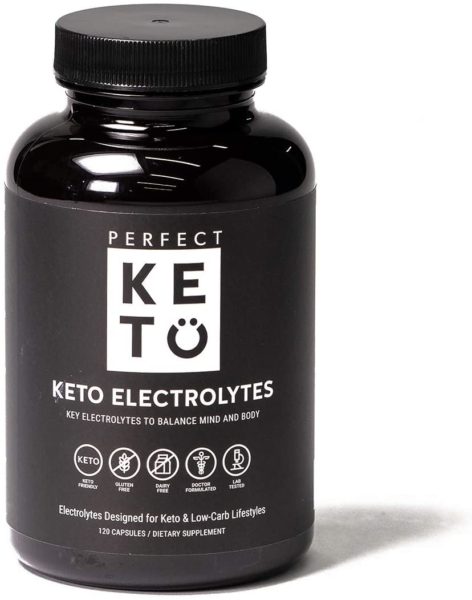
Perfect Keto is a trusted and established brand, providing a variety of supplements for keto dieters — like exogenous ketones, MCT oil, protein powder, and collagen — along keto-friendly snacks and beverage mixes. Luckily, this esteemed brand offers an electrolyte supplement too.
The supplement contains the electrolytes you need, but is also completely gluten and dairy free to meet any specific dietary needs you may have in addition to keto. According to Perfect Keto, the formulation was developed by doctors and lab tested.
6. Vitamin Bounty Tune Your Keto Multivitamin + Electrolytes
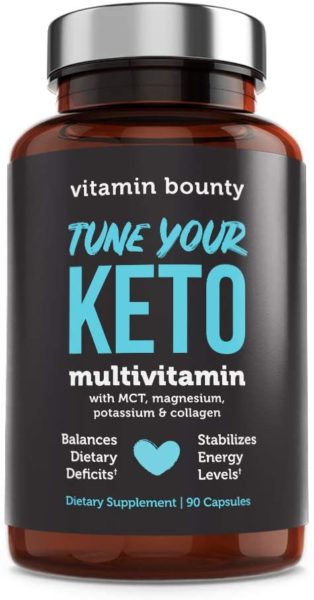
This keto electrolyte supplement from Vitamin Bounty is also a multivitamin, so it really covers your bases.
Along with all these nutrients, the supplement also contains added MCT oil, which can help your body make more ketones and burn more fat.
The supplement also contains a “Keto Blend” with good-for-you ingredients like chicken bone broth collagen, apple cider vinegar, ashwagandha, and ginger.
7. Keto Vitals Electrolyte Capsules
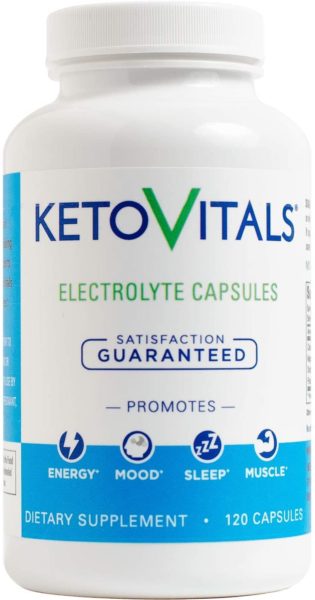
Keto Vitals offers a straight-forward solution for preventing leg cramps on keto with their electrolyte capsules.
They contain the electrolytes you need — calcium, sodium, potassium, and magnesium, while being free of sugar, dyes, and artificial flavors.
The manufacturer suggests taking them alongside a vitamin D supplement, as vitamin D helps your body to absorb calcium better.
8. Adapted Nutrition Keto K1000 Electrolyte Powder
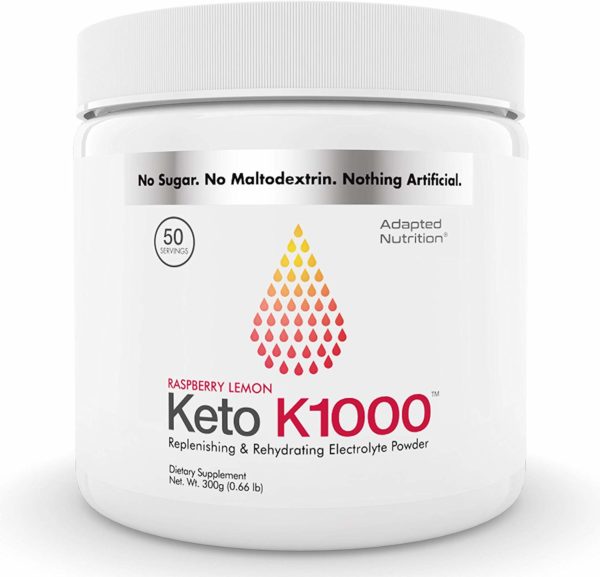
Adapted Nutrition brings us a uniquely formulated keto electrolyte supplement with some added benefits.
It’s made with high quality ingredients like sea salt and easily absorbable magnesium citrate, and sweetened with stevia — making it a tasty and healthy addition to your keto diet.
It also contains a blend of trace minerals called ConcenTrace, which is made of minerals that are naturally sourced from the Great Salt Lake
9. Ultima Replenisher Electrolyte Hydration Powder
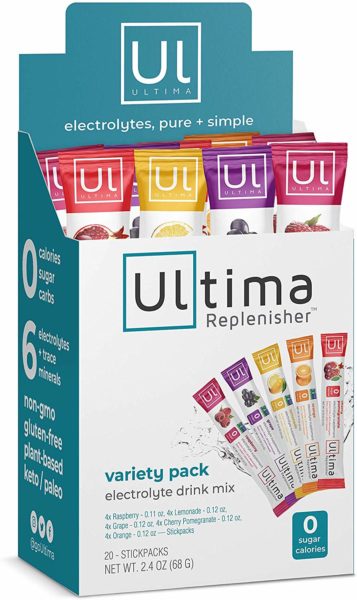
These electrolytes from Ultima come in convenient stick packs that you can add to bottled water. They come in five unique stevia-sweetened flavors to give you some variety, and they’re plant-based and appropriate for keto and paleo diets.
Along with calcium, magnesium, potassium, and sodium, this supplement also provides zinc, phosphorus, and manganese — which can help boost your immune system and your energy levels.
10. LMNT Recharge Electrolyte Hydration Powder
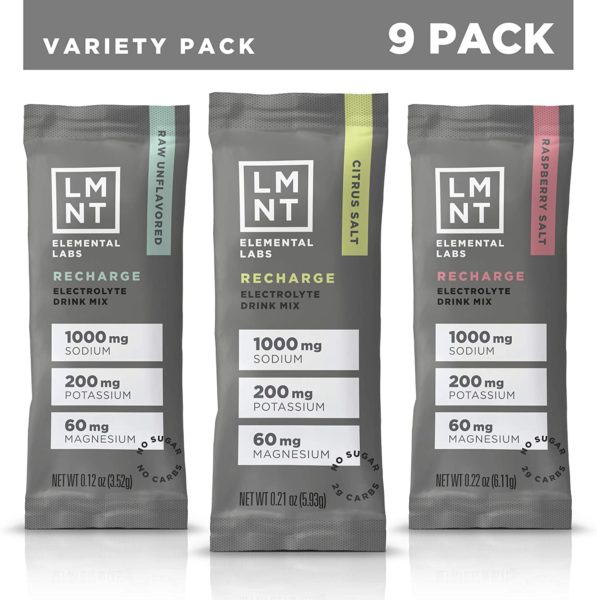
LMNT Recharge was developed by Robb Wolf, a trusted name in the keto and paleo world, and his team at Elemental Labs. It’s earned a place on this list because LMNT truly understands the increased sodium needs of people on keto.
Their product provides a whopping 1,000 milligrams of sodium per serving, which outshines most other electrolyte supplements on the market (and makes it much easier to reach your sodium goals on keto).
Sweetened with stevia, and available in stick packs in three different flavors, it’s a perfect on-the-go electrolyte solution.
Category winners
Best keto supplement overall: Zeal Naturals Maximum Keto Electrolytes
Zeal Naturals provides a great balance of sodium, potassium, magnesium, and calcium, alongside vitamins B6 and B12 for an energy boost. The sodium content isn’t too high, making it great for dieters, and the trace minerals like zinc and magnesium make it well-suited for athletes as well. This robust all-around profile makes it our top choice.
Best keto supplement pills: Zeal Naturals Maximum Keto Electrolytes
Keto supplement pills make it dead-easy to keep your electrolyte intake high. Zeal Naturals, our top overall pick as well, comes in simple vegetable-based capsules that offer a mess-free solution for keto supplementation.
Best keto supplement powder: Key Nutrients Electrolyte Recovery Plus
For finer control of dosage, or for blending your keto supplement into a custom keto shake, opt for Key Nutrients Electrolyte Recovery Plus. This flavored powder has an incredible range of trace minerals that helps to shore up any deficiencies you might have, given the vagaries of the keto diet.
Best keto supplement for weight loss: Total Hydration Keto Electrolytes
Total Hydration Keto Electrolytes is the simplest option out there for dieters who want to ensure their electrolyte levels stay topped off when on the keto diet. You get no extraneous ingredients that might interact with other weight loss supplements, just calcium, magnesium, sodium, and potassium, all naturally-sourced.
Best keto supplement for energy: Zeal Naturals Maximum Keto Electrolytes
If you’re used to carb-heavy snack foods to bolster your energy, keto can be a rude awakening. Instead, opt for Zeal Naturals Maximum Keto Electrolytes. These keto supplements give you a boost of energy thanks to their hefty vitamin B6 and B12 content, and don’t skimp on the electrolytes either.
Best keto supplement for athletes: Key Nutrients Electrolyte Recovery Plus
If you’re doing keto while maintaining an intensive exercise program, our recommendation is Key Nutrients Electrolyte Recovery Plus. Its high content of both basic electrolytes and less common trace minerals like copper and selenium make it great for replacing lost electrolytes in sweat during tough workouts.
Who should buy a keto supplement?
Most keto supplements fall into two broad categories: ketone supplements and electrolyte supplements. If you’re on the keto diet or about to start the keto diet, you may benefit from taking an electrolyte supplement.
People on keto have increased needs for electrolytes like potassium and sodium to prevent muscle cramps, and it can be hard to meet these needs through your diet — especially if you’re busy (1).
You may want to avoid keto supplements that contain sodium and potassium if you have any heart conditions or if you’re taking blood pressure or heart medications. Sometimes excessive amounts of these electrolytes can worsen your condition or interfere with your medications. If you have a heart condition or are taking blood pressure or heart medications, you should consult a doctor before you start keto or start taking keto supplements.
In addition, you should avoid taking these supplements if you are pregnant or nursing, unless your doctor tells you it’s safe to do so.
Be sure to talk to a doctor before you start taking a keto supplement if you have any concerns.
How we ranked
We take ranking supplements very seriously, and the very first consideration we made was whether the supplement was appropriate for a keto diet.
We assessed each supplement to see if it truly provided nutrients that keto dieters need, like magnesium, sodium, potassium, or B vitamins.
We also checked to see if it contained other ingredients that may be beneficial for people on a keto diet, like MCT oil or apple cider vinegar — both of which may help ramp up weight loss.
Next, we reviewed the quality of the supplements to ensure they met our stringent standards.
Because supplements are not regulated by any governing bodies, we seek out trusted brands or brands that have pursued third party testing to ensure that their labels are accurate and reflect what’s actually in the bottle. Some of these third party testing organizations include United States Pharmacopeia, NSF International, and ConsumerLab.
After critically assessing each supplement based on these factors, we were able to assemble our list of the top keto supplements on the market in 2020.
Benefits
Keto supplements can prevent muscle cramps. As we discussed above, starting a keto diet flushes glycogen, fluid, and electrolytes quickly out of your system — which can lead to electrolyte imbalances and muscle cramps.
Because of this, supplementing with electrolytes like sodium, potassium, and magnesium can help prevent muscle cramps.
In addition, taking these electrolytes may quickly help you get rid of muscle cramps if you’re currently experiencing them.
Keto supplements can help you stay in ketosis. Many of the keto supplements on our list also contained MCT oil, a type of oil that may make it easier for you to stay in ketosis.
The unique characteristics of MCT oil make it very efficient at creating ketones, the fat-based fuel your body uses when you’re in ketosis. Therefore, adding an MCT oil supplement can help you to create more ketones and may help keep you in a deeper state of ketosis (2).
Keto supplements can help you lose weight. Along with MCT oil, which can help you create more ketones and burn more fat, several of the supplements we listed also contain other potentially fat-burning ingredients that can help you lose more weight like probiotics, chromium, apple cider vinegar, and ginger.
Although more research is needed, probiotics may potentially play a role in weight regulation by improving your blood sugar levels and insulin sensitivity. Since insulin is a fat storage hormone, improving your insulin sensitivity can help your body use less — theoretically resulting in less fat storage (3, 4).
Chromium supplementation has also been linked to lower body weight and a decreased risk of gaining weight as you age, but more research is needed to fully understand their connection (5).
Our second-ranked recommendation, the electrolyte supplement from Youth & Tonic, contains both probiotics and chromium.
Additionally, there is some limited evidence to support the use of apple cider vinegar for weight loss. In animal studies, apple cider vinegar increases fat oxidation — or fat burn — in obese rats and reduces oxidative stress, which can decrease chronic inflammation, a contributor to obesity. More research in humans is needed to draw further conclusions, however (6, 7).
Finally, ginger may also help boost weight loss. There is promising research in animals and humans showing that ginger supplementation is associated with weight loss and increased rates of fat burn (8).
However, it’s important to remember that one of the key factors in weight loss is diet. You can’t take supplements while eating an unhealthy diet and expect to lose weight, but supplements can help give you a little weight loss boost if you’re already taking steps to improve your diet.
Keto supplements can help prevent nutrient deficiencies. Most people don’t get enough potassium to meet their daily needs, so taking a keto electrolyte supplement can help you meet your potassium needs. The same goes for magnesium.
There’s also some evidence to suggest a ketogenic diet may lead to deficiencies in certain B vitamins. This may be because many flour-based foods and cereals are fortified with B vitamins, and these foods are off-limits on keto (9).
Luckily, several of the supplements in our ranking also include B vitamins and can also be used as a daily multivitamin.
Keto supplements can help you sleep better. All of the supplements on our list provide magnesium, which may improve your sleep quality. Although more research is needed, some studies suggest that there is an association between magnesium status and the quality of your sleep (10, 11).
Many people on keto also experience night-time leg cramps that can keep them awake, especially when first starting the diet. These are associated with electrolyte imbalance, and reversing the electrolyte imbalance — through diet or supplement — can ease these night-time leg cramps so you can rest.
A keto supplement can make it easier to stick to your diet. Taking an electrolyte supplement can make it easier to get through the keto flu. In fact, if you supplement properly, you may not experience the keto flu at all when starting keto.
Because of this, you may find that it’s easier to stick to the diet because you feel better than you would otherwise.
Keto supplements can increase your stamina and energy during workouts. Electrolyte replenishment is important for any athlete, not just people who are on keto. Electrolytes can be lost through the sweat during intense workouts, so it’s important to replenish electrolytes as you replace fluids to prevent electrolyte imbalances.
For athletes, the drink mixes or powders may be the most convenient option — as they can be easily taken while you’re working out.
Others who may benefit from taking extra electrolyte supplements include those who work outdoors, especially in hot climates.
Keto supplements may improve your mood. Some research suggests that magnesium can help lift your mood and decrease your risk of depression. In addition, feeling your best and not having to deal with the keto flu or muscle cramps will help keep you feeling your best.
Magnesium supplementation may also increase the effectiveness of certain antidepressant drugs (12).
Keto supplements may decrease food cravings. There are some anecdotal reports that getting adequate sodium can help decrease the severity of your carb cravings. Additionally, getting adequate magnesium may also help decrease your sugar cravings. However, there is no research to support these claims. More research is needed to fully understand the potential link between these minerals and food cravings.
Side effects
In recommended doses, these supplements should have minimal side effects.
Keto supplements may cause allergic reactions. However, if you are allergic or sensitive to any of the ingredients in a supplement, you may have an adverse reaction to it. Be sure to read the label thoroughly before you purchase.
Keto supplements may affect your heart. You should be careful taking large doses of keto supplements that contain potassium, because high doses of potassium supplements can affect your heart’s rhythm — potentially leading to a heart attack. Don’t take more than 500 milligrams of potassium at once from a supplement, especially not on an empty stomach (13).
Keto supplements may interfere with your digestion. Additionally, high doses of magnesium can have a laxative effect. In fact, magnesium citrate is used as a medication to help reverse constipation.
MCT oil may also cause stomach upset if you don’t gradually ramp up the amount you use over time. Don’t start using MCT oil by taking large doses. Start small and build up gradually.
If you have any concerns about these supplements or feel like you’re experiencing any complications, be sure to consult a healthcare provider.
Recommended dose
On keto, you need plenty of electrolytes to prevent muscle cramps and keto flu.
Sodium is a vital nutrient, but many flawed studies have blamed sodium for high blood pressure. Although it can increase blood pressure in certain salt sensitive individuals, some research indicates that eating more potassium can improve blood pressure levels — even if you’re eating a lot of sodium.
According to some studies, you need a daily intake of 3,000 to 6,000 milligrams of sodium — much higher than the Dietary Guidelines for Americans recommendation of 2,300 milligrams or less per day (14, 15, 16, 17).
In addition, you need to eat plenty of potassium as well. The Daily Value (DV) for potassium is 4,700 milligrams per day — which you need to help regulate blood pressure, fluid balance, and heart health. Although it’s possible to meet all of your potassium needs through diet alone, it may be much easier for you to supplement with potassium.
Finally, you will also need to get adequate magnesium. You should aim for 400 milligrams per day. Again, it’s possible to meet your magnesium needs through diet alone, but it may be much easier for you to take a supplement (18).
The supplements listed above will not provide 100% of your needs for these nutrients, but they are in addition to your diet to help meet your needs. Including a variety of vegetables and meats, along with a high quality salt, will go a long way towards helping you meet your electrolyte needs — in addition to one of the electrolyte supplements listed above.
Some of these supplements also contain MCT oil, which has no recommended dose — however, you should be careful not to take too much at once because it can cause stomach upset.
FAQ
Q: Do keto supplements help with the keto flu?
A: When you start keto, your body uses up all of its glycogen stores. Glycogen is sugar that’s stored in your liver and muscles. Glycogen is also stored with water, so as you start to burn through your glycogen stores your body starts to flush out this water.
That’s why you may notice that you pee a lot more on keto, especially when you first start. It’s also why you may notice that you’re losing large amounts of water weight during your first couple of weeks on the diet.
Unfortunately, when you lose this excess glycogen and water, you also lose sodium, potassium, and magnesium, key electrolytes that keep your muscles functioning properly. That’s why you need to supplement with larger amounts of these nutrients than normal when you’re doing keto.
To a lesser extent, you may also lose some calcium. These four electrolytes — sodium, potassium, magnesium, and calcium — regulate fluid balance, acid-base balance, blood pressure, and nerve and muscle function. On their own, each of these minerals also has its own benefits as well. For example, potassium may help boost heart health, while calcium helps ensure strong and healthy bones.
When people starting keto don’t get enough electrolytes, they can feel abnormally tired and may have muscle cramps,headaches, and charlie horses in their legs — especially at night. This is known as the “keto flu.” Although it only lasts for a few days as your body makes the transition into ketosis — when it’s burning fat for energy instead of carbs — it can make many people give up. That’s why you should try to prevent it from happening in the first place.
The easiest way to prevent the keto flu is to take an electrolyte supplement that’s specially formulated for keto dieters.
Q: Should I take a keto supplement if I’m doing dirty keto?
A: If you’re doing “dirty keto” — where you only count net carbs and don’t worry about ingredients or food quality — you may be more likely to come up short of meeting your nutrient needs, as you’ll probably be eating fewer whole, nutrient-dense foods like plain meats, fats, and veggies. A supplement can help ensure you’re meeting all of your needs.
However, even if you’re on clean keto, where you’re only eating the highest quality, whole foods, you may benefit from a supplement just to make sure all of your bases are covered.
Q: Can you take a keto supplement if you’re not on keto?
A: These high-quality supplements can be used by people on low-carb diets that aren’t as strict as keto, or by anyone who’s cutting excess carbs or sugar from their diet. For instance, people on paleo or Mediterranean diets — which are naturally lower in carbs than a standard diet — may benefit from these added electrolytes.
In addition, if you work out regularly or work outdoors in a hot climate, these keto electrolyte supplements can help you replenish the electrolytes you lose through your sweat.
Q: Do I need a keto supplement to do the keto diet successfully?
A: Fortunately, a well-planned keto diet that includes a wide variety of meat, eggs, fish, and shellfish, healthy fats, fruits, and low-carb vegetables can provide most of the nutrients you need.
However, supplements can help fill the gaps in your diet. Taking a supplement makes it much easier to meet your needs for potassium, sodium, and magnesium — which are vitally important on keto to help prevent the keto flu and muscle cramps.
Q: Are there any other keto supplements that may be beneficial to people on keto?
A: Depending on your personal needs, there may be other supplements you wish to take. If your goal is weight loss, you may want to add an additional supplement like apple cider vinegar or ginger, which — according to some limited evidence — may help you lose weight by helping regulate your blood sugar and insulin levels and increasing your fat burn.
Vitamin D is also a great vitamin to supplement with, as many people are deficient in it. Vitamin D helps boost your immune system and keep your bones strong.
Additionally, a supplement containing B-vitamins is a good idea as well, because many people get B-vitamins through eating fortified bread and cereals — which are off-limits on keto.
Q: Should I take a keto supplement with ketones in it?
A: Many people choose to take exogenous ketones when they’re on keto, but they’re not necessary to successfully lose weight. Ketones are breakdown products of fat, and they are the material that your body burns for fuel when you’re in ketosis and no longer burning sugar for energy.
Although your body can produce ketones on its own, some people report improved energy levels and stamina from supplementing with exogenous ketones as well.
Additionally, some interesting research indicates that exogenous ketones may help improve your memory, concentration, and mental health. They have been studied for use in people with Alzheimers with promising results. However, more research is needed to fully understand the effect of exogenous ketones on brain health.
Q: What time should I take my keto supplements?
A: It’s up to you when you want to take your supplements, although many people choose to take them in the morning.
Be sure to take them at the same time daily to help create a routine and minimize your risk of forgetting to take them.
Also, make sure you follow all of the directions listed on the supplement package.
Q: Do I need to take my keto supplements with food or on an empty stomach?
A: Generally, it’s best to take your supplements with food. Taking supplements on an empty stomach can sometimes cause nausea or stomach upset. It doesn’t have to be a lot of food either, just a small snack or meal.
Be sure to read the package for further guidance, as some supplements may be more effective when taken on an empty stomach.
Q: When should I notice a difference in how I feel taking keto supplements?
A: If you’re supplementing electrolytes to help prevent the keto flu or muscle cramps, you may not notice a difference in how you feel. However, the supplement will help keep you from experiencing electrolyte imbalances.
On the other hand, if you’re already experiencing muscle cramps due to electrolyte imbalances on keto, taking adequate amounts of electrolytes may help you feel better almost immediately — within hours.
For other vitamins or supplements — like vitamin D, B vitamins or supplements that may help you lose weight like ginger or apple cider vinegar, it may take up to two weeks or longer to feel any effects or notice any difference.
Related articles
Recap
Keto supplements can be divided into two broad categories: electrolyte supplements and ketone supplements. Getting adequate amounts of electrolytes — like sodium, potassium, and magnesium — in your diet is vitally important while on keto to prevent muscle cramps.
Our top 3 keto electrolyte supplement recommendations are Zeal Naturals Maximum Keto Electrolytes, Youth & Tonic MCT Keto Electrolyte Supplement, and Key Nutrients Electrolyte Powder.
Not only can these supplements help you prevent muscle cramps, but they can also help you stay in ketosis, lose weight, get plenty of vital nutrients, stick to your diet, and sleep better.
You should be careful not to take excessive amounts of these supplements, as that can lead to complications and side effects. Be sure to talk to a healthcare provider if you have any concerns.
Although supplements aren’t necessary on keto, they can help keep you in tip-top shape and better able to stick to your diet and meet your health goals.
For BodyNutrition’s #1 keto supplement recommendation, click here.
